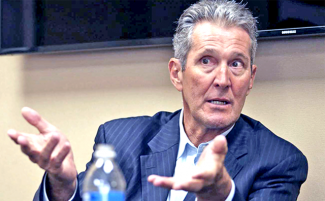DOCS OR COPS
Pallister considers police clamp down as covid control in Manitoba

Manitoba Premier Brian Pallister
PALLISTER COULD CALL THE COPS ON COVID. The Manitoba premier thinks doing that just might help stop the runaway spread of Covid-19 in the province. Everything else he has tried so far hasn’t worked. In fact, many believe the Pallister approach to the pandemic has made it as bad as it is.
Manitoba’s infection rate on November 4 was 150 per 100,000—more than double the rate in every other province and territory. The current speed of pandemic growth is nearly double that of the first wave in the spring.
Pallister wanted Manitoba to be the first place in Canada to reopen its economy. Health experts warned him not to do it.
Pallister ignores the science
Doctors wrote open letters to Pallister warning that the province was on the verge of being overwhelmed. One letter signed by over 200 doctors stated they had watched Manitoba’s “COVID pandemic spiral out of control” due to government inaction.
The doctors’ prediction is now a fearsome reality in Manitoba. It is a reality even Pallister himself can no longer deny.
On November 2, Pallister’s government declared a code red in Winnipeg, shutting down bars, restaurants, movie theatres and sports facilities while postponing non-urgent surgeries.
Pallister refuses to accept any responsibility for any of this. Manitobans only have themselves to blame, he says, because they do “dumb things” like visiting their families over Thanksgiving. His latest idea on how to fix things is to use the cops to clamp down on people ignoring covid safety guidelines.
Police clamp down considered
Pallister broke the news on November 2 that his government is “seriously considering” imposing a curfew, blaming “late-night situations in Winnipeg” for the recent deluge of cases. But, if it comes to that, he doesn’t want anyone to blame him.
On November 3 the Pallister government launched a brief online survey with questions about what time each day a curfew should start, who should be exempt (such as first responders, city crews, grocery store workers), and which areas of the province should be subject to a curfew.
The survey also asked people to list places where they have seen people violating the current restrictions in place in Manitoba, and how they report those violations.
For any curfew to work, the province will also need a buy-in from Winnipeg police and RCMP to enforce it, Pallister said, again pointing a finger at the need to break up “the big house parties that have been happening.”
Winnipeg police got the message. The day after the premier’s musings about a possible curfew they announced they would be immediately stepping up enforcement of COVID-19-related public health orders, taking particular aim at house parties and other big gatherings.
“Our job is making sure people understand how serious this is and we are going to do that through fines,” Winnipeg Police Service Constable Rob Carver said.
Provincial public health orders limit public and private group gathering sizes to five. Fines for individuals breaching public health orders have been increased to $1,296—the second-highest penalty of its kind in Canada.
“This is a signal [we are serious],” Carver said. “The numbers are up, our response is up.”
Just do the right thing
Manitoba doctors say a police-enforced mandatory curfew won’t help. It might even prompt more deliberate violations of prevention guidelines from people who “refuse to be pushed around by government.” What will help, the doctors say, is more funding and healthcare resources.
A tweet from Doctors Manitoba, an organization representing Manitoba’s physicians, resident physicians an medical students, said: “A curfew is NOT needed for Manitobans to do the right thing, just like you always do when neighbours are in need. Donating blood, passing sandbags, Manitobans step up in emergencies. Right now you can help by staying home.”
Other activists point out that Pallister’s plan to impose a police clamp down will just bring more harm to Winnipeg’s vulnerable homeless and Indigenous populations. In addition, it will not answer the pointed question: “How does a curfew and issuing tickets stop the current spread in personal care homes and hospitals?”
- 30 -













Add new comment